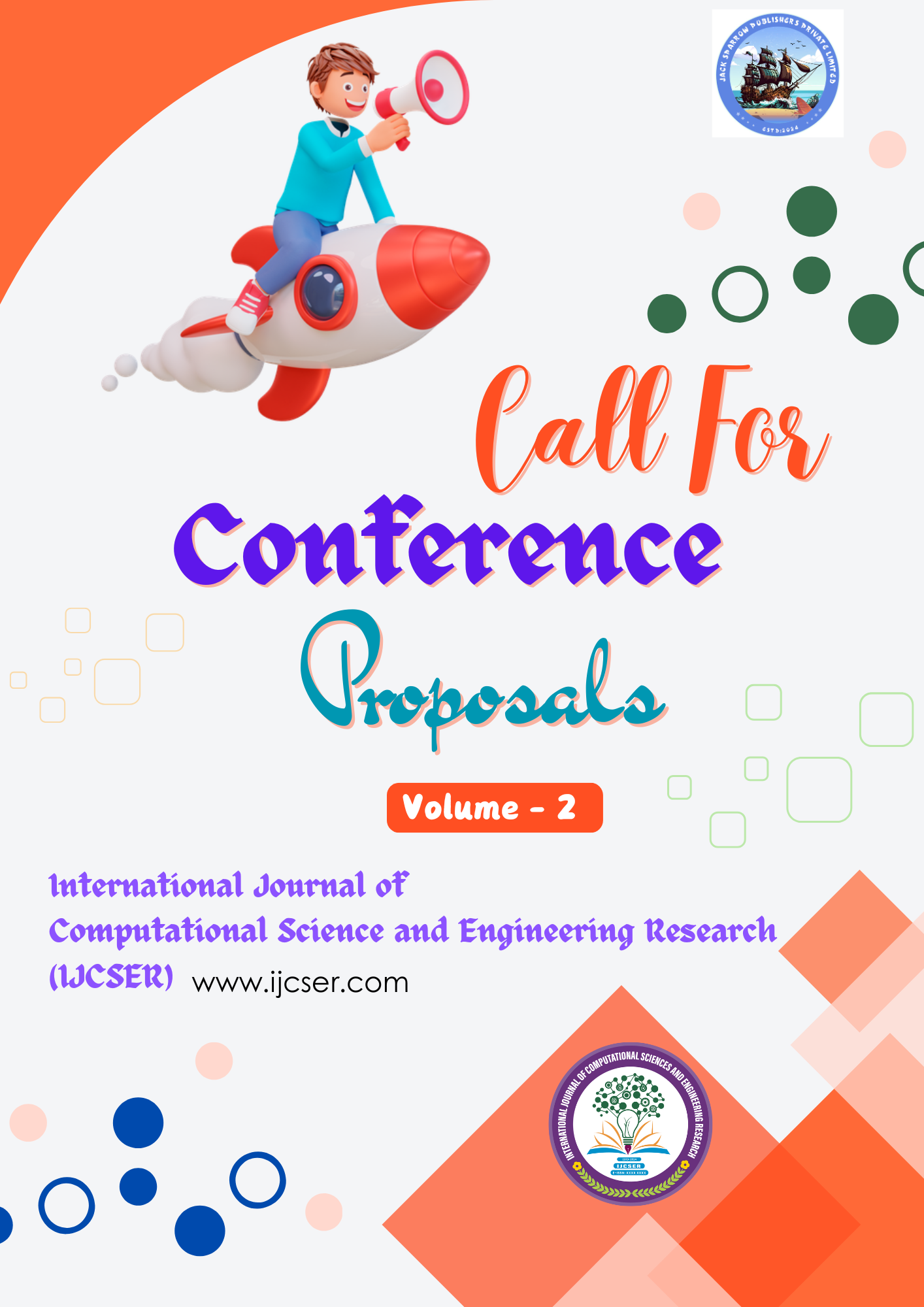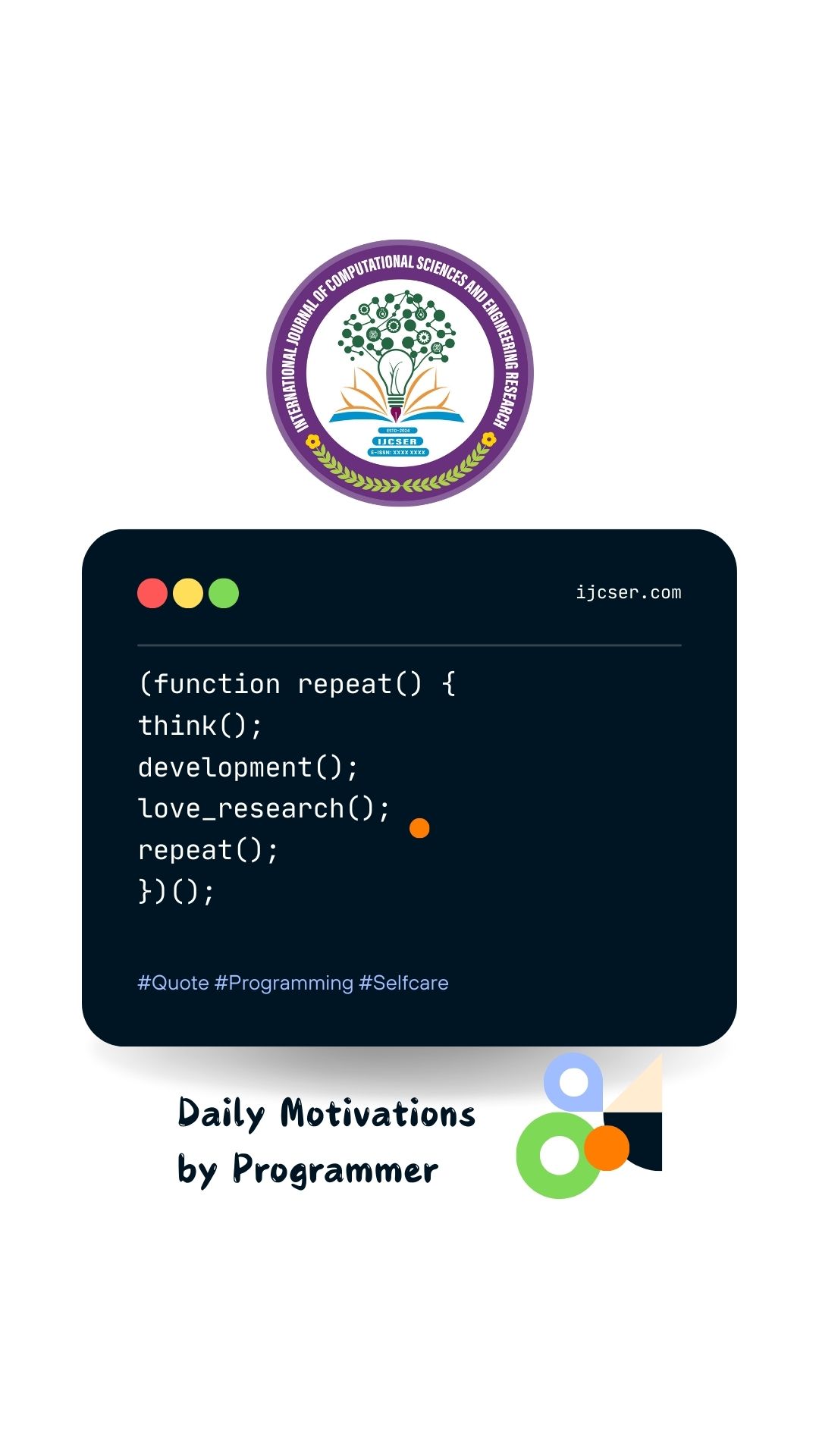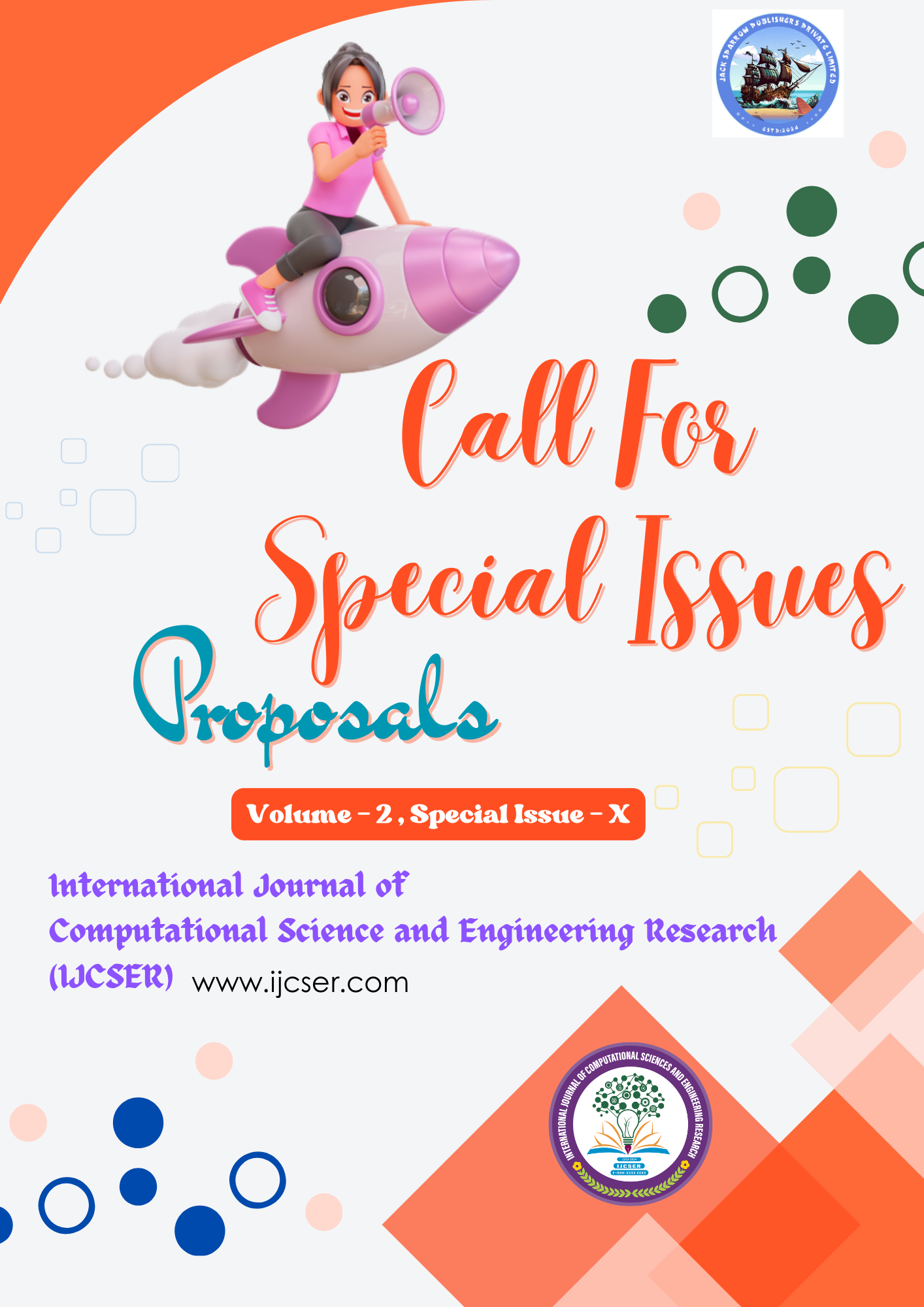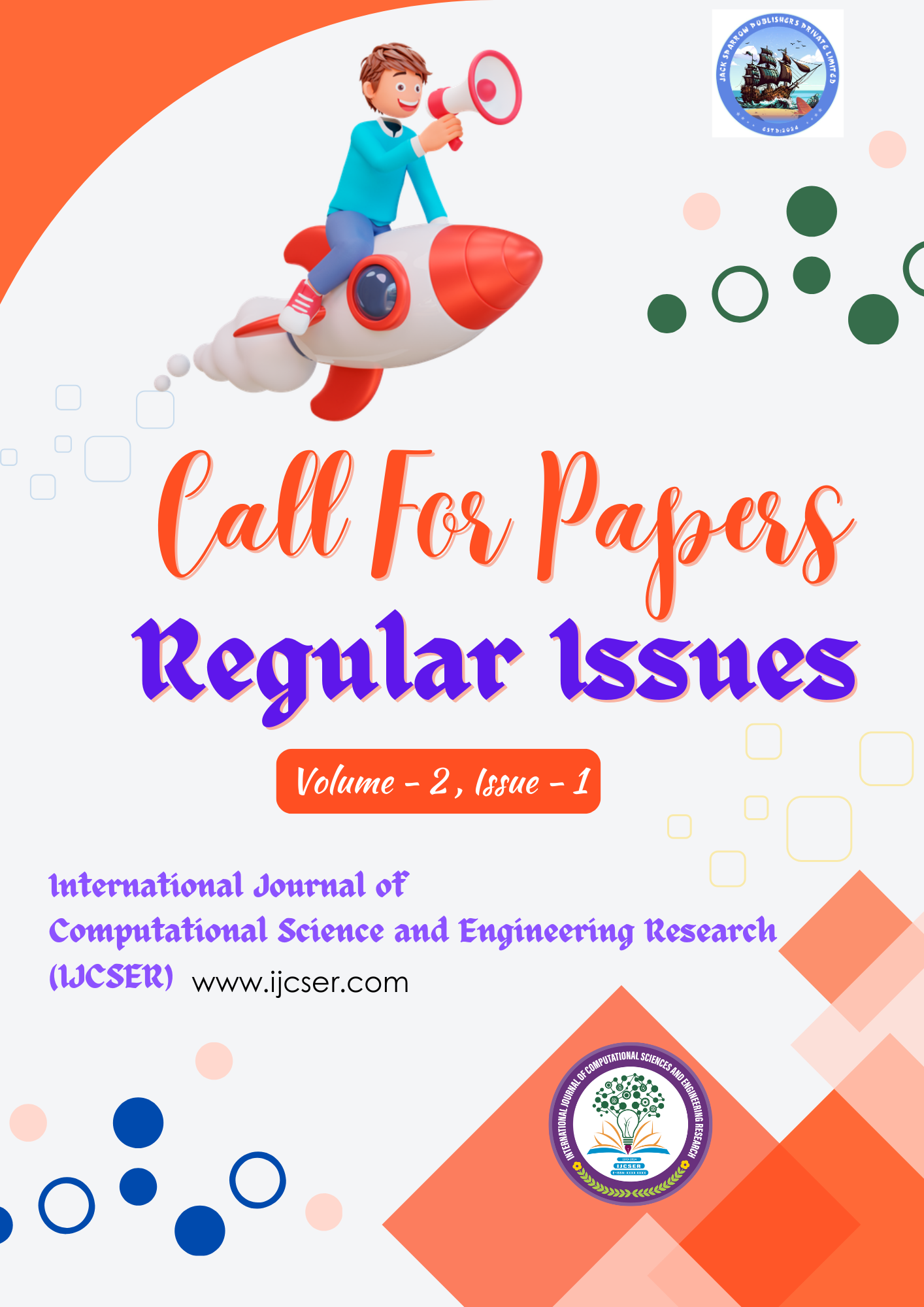 About Us
About Us
The International Journal of Computational Science and Engineering Research , e-ISSN: 3107 - 8605 is an open access, Scholarly Peer Reviewed and Fully Referred Open Access Multidisciplinary Quarterly Research academic research journal for scientists, engineers, research scholars, and academicians, curisioty minds which gains a foothold in Asia and opens to the world, aims to publish Original Research , Theoretical, Editorial, Review and Practical advances in typically focuses on the Research and development and application of All Engineering and Science Branches along with various methods and techniques in various scientific and engineering fields. It aims to bridge the significant gap between research and practice by promoting the publication of original, novel, industry-relevant research. Authors are cordially invited to submit full length paper, Original and unpublished research articles, based on theoretical or experimental works, are solicited for publication in the journal. Submission of article implies that the work described has not been published previously (except in the form of an abstract or academic thesis) and is not under consideration for publication elsewhere.
Journal Title International Journal of Computational Science and Engineering Research
Frequency Quaterly
e-ISSN 3107 - 8605
Publishers Jack Sparrow Publishers
DOI https://doi.org/10.63328/IJCSER
Editor-In-Chief Bosubabu Sambana
Copyright International Journal of Computational Science and Engineering Research, Jack Sparrow Publishers
Startting Year 2024
Subject Multi Disciplinary Subjects
Language English
Publication Format Online
Phone No +91 9640641136
Email ID editor-in-chief@ijcser.com, info@ijcser.com , bosukalam@gmail.com
Mobile No +91 9640641136
Website www.ijcser.com
Address Bosubabu Sambana, Door.No:20-3-72, Purushothapuram, Gandhinagar,Palasa, Srikakulam Dist, Andhra Pradesh, India-532221
Aim
The International Journal of Computational Science and Engineering Research aims to foster the development and dissemination of innovative research in computational science, engineering, and technology. The journal focuses on advancing the understanding and application of computational methods and techniques across a variety of engineering disciplines. It seeks to provide a platform for researchers, engineers, and practitioners to share their insights, findings, and developments in computational models, algorithms, simulations, and systems.
The International Journal of Computational Science and Engineering Research aims to provide a high-quality platform for researchers, scientists, and engineers to publish their cutting-edge work in the fields of computational science, computational mathematics, and engineering applications. The journal seeks to contribute to the advancement of computational methodologies, algorithms, and techniques, and their application to real-world engineering and scientific problems.
It aspires to promote interdisciplinary research that bridges the gap between theoretical studies and practical engineering solutions, encouraging the development of innovative technologies that contribute to societal progress. It also aims to foster collaboration and knowledge exchange across the global research community.
Scope and Objectives
The journal aims to publish high-quality research articles that advance the state of the art in computational science and engineering. It seeks to bridge the gap between theoretical research and practical applications by showcasing innovative computational techniques and their implementations.
This is a dedicated source for high quality papers in the electronics and communications, aimed to inform practising professional engineers who were involved in electronics and communications by providing coverage of new developments in a serious technical manner.
Papers are solicited from, but not limited to the following topics:
Below is a detailed list of various Engineering and Science Branches that can be included in the scope of a journal, these branches encompass a wide range of Multidisciplinary topics that align with computational science, engineering, and research applications. This list can be tailored to the specific focus and objectives of the journal:
|
Engineering Branches |
Science Branches |
|
Computer Science and Engineering Artificial Intelligence machine Learning Deep Learning Computer Networks Software engineering and development Algorithms and data structures High-Performance Computing (HPC) and cloud computing Artificial intelligence and machine learning Cybersecurity and data protection Computational Modeling and simulation tools
Mechanical Engineering Computational fluid dynamics (CFD) Solid mechanics and materials science Thermal systems and heat transfer simulations Vibration analysis and structural mechanics Robotics and automation Manufacturing processes and simulation
Civil Engineering Structural analysis and design Geotechnical engineering and soil mechanics Water resources and hydrodynamics simulations Transportation engineering and network analysis Construction management and project simulation
Electrical Engineering Power systems and electrical grid modeling Signal processing and communications systems Control systems and automation Microelectronics and semiconductor simulations Electromagnetics and antenna design
Chemical Engineering Process modeling and simulation Chemical reaction engineering and kinetics Transport phenomena in fluids and gases Environmental engineering and pollution control Biochemical and biochemical engineering simulations
Aerospace Engineering Aerodynamics and aircraft design simulations Satellite and spacecraft modeling Flight dynamics and control systems Space propulsion systems and simulations Structural integrity and stress testing in aerospace components Computational Data Science and Engineering
Software Development Data Structures and Algorithms High-Performance Computing (HPC) and cloud computing Artificial intelligence and machine learning Data Engineering and Data Protection Computational Modeling and Simulation tools
Biotechnology and Bioengineering Biomedical modeling and simulation Genetic engineering and gene editing technologies Bioprocessing and bioinformatics Tissue engineering and regenerative medicine Computational genomics and systems biology
Environmental Engineering Pollution control and environmental protection Waste management and recycling technologies Renewable energy and sustainable systems Environmental impact assessment simulations Climate modeling and environmental data analysis
Industrial Engineering Optimization and operations research Supply chain modeling and logistics simulation Production and manufacturing systems Human factors engineering and ergonomics Industrial automation and control systems
Petroleum Engineering Reservoir simulation and modeling Drilling and production engineering Exploration and resource management Hydrocarbon transport systems and pipeline Environmental impact of petroleum extraction
Materials Science and Engineering Nanotechnology and nanomaterials Computational materials modeling Materials characterization techniques Smart materials and structures Corrosion and failure analysis
Mining and Mineral Engineering Mineral processing simulations Mine safety and environmental impact assessments Geomechanics and resource extraction modeling Automation and robotics in mining Geophysical exploration techniques
Nuclear Engineering Nuclear reactor modeling and simulation Radiation protection and shielding Nuclear waste disposal and management Fusion energy and plasma physics simulations Nuclear safety analysis and risk management
Marine and Ocean Engineering Ship design and hydrodynamics Offshore structures and platform simulation Marine renewable energy (wind, tidal, wave energy) Oceanography and climate change impact studies Coastal engineering and flood modeling |
Physics Computational physics and simulations Quantum mechanics and modeling Plasma physics and thermodynamics Solid-state physics and materials science Astrophysics and cosmology simulations
Chemistry Computational chemistry and molecular modeling Chemical reaction simulations Environmental chemistry and pollutants modeling Nanomaterials and nanochemistry Chemical engineering simulations in industrial processes
Biology Bioinformatics and computational biology Genetic modeling and simulations Systems biology and computational neuroscience Structural bioinformatics and protein folding Computational ecology and biodiversity studies
Mathematics Applied mathematics in engineering and science Numerical analysis and optimization Mathematical modeling and simulations Stochastic processes and statistical modeling Mathematical techniques in machine learning and AI
Environmental Science Climate modeling and atmospheric sciences Ecological modeling and biodiversity studies Water quality and hydrology simulations Land use and urban planning modeling Environmental risk assessment and management
Geology and Earth Sciences Geophysical modeling and seismic data analysis Geospatial analysis and geographic information systems (GIS) Earthquake simulation and modeling Geological resource management and exploration Soil and sediment transport modeling
Agricultural Science Precision agriculture and crop modeling Soil health and agricultural sustainability simulations Climate change and its impact on agriculture Agricultural biotechnology and genetic modification simulations Irrigation and water management systems in agriculture Social Sciences (Interdisciplinary Science) Computational sociology and behavioral simulations Economic modeling and analysis Social network analysis and agent-based modeling Psychological modeling and simulation Public policy analysis using computational tools
Health and Medical Sciences Medical imaging and diagnostic simulations Epidemiological modeling and disease spread Computational neuroscience and brain modeling Biomechanics and human health simulations Pharmaceutical modeling and drug discovery |
This list covers a broad spectrum of all engineering and science branches that are relevant for interdisciplinary computational research, which would be appropriate for inclusion in a journal These topics would typically be explored using computational models, algorithms, simulations, and other advanced tools in various academic and industrial applications.








